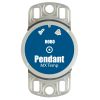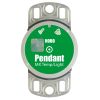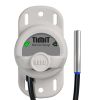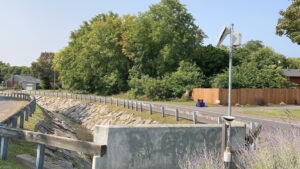Onset HOBO TidbiT MX Temp 400 Logger
Features
- Waterproof to 120 meters (400 feet)
- Water detection feature records when the logger is in and out of the water
- Convenient wireless setup and download via Bluetooth Low Energy (BLE)
- Expedited repair and warranty service
- Lifetime technical support
- More
Overview
The Onset HOBO MX2203 TidbiT waterproof temperature logger leverages the power of Bluetooth Low Energy (BLE) to deliver high-accuracy temperature measurements straight to a mobile device or Windows computer with Onset's free HOBOconnect app. Designed for durability, this rugged, waterproof logger is ideal for long-term deployments in streams, lakes, and oceans (up to 400-foot depths). The Onset HOBO MX2203 also provides the additional feature to detect and record the presence of water, which is ideal for monitoring intermittent water applications.
Benefits
- Convenient wireless setup and download via Bluetooth Low Energy (BLE)
- Large memory stores 96,000 measurements
- Waterproof to 120 meters (400 feet)
- Water detection feature records when the logger is in and out of the water
- User-replaceable battery
- Waterproof boot protects the logger during deployment
- LED alarm notifies when temperature exceeds the set threshold
- Battery life extension feature
- Works with Onset’s free HOBOconnect app
- ±0.2°C (±0.36°F) accuracy
In The News
Monitoring Meadowbrook Creek: Real-Time Data Collection in an Urban Creek
Meadowbrook Creek in Syracuse, New York, has been monitored by Syracuse University (SU) faculty and students for over a decade. Originally established by Dr. Laura Lautz in 2012, the early years of the program focused on collecting grab water samples for laboratory analysis and evaluating the impact of urban land use, human activities, and natural processes on water resources. Tao Wen , an Assistant Professor in SU’s Department of Earth and Environmental Sciences, took over the program in 2020 and upgraded the existing systems to include 4G modems that allowed for real-time data viewing. [caption id="attachment_39339" align="alignnone" width="940"] An overview of the Fellows Ave monitoring station along Meadowbrook Creek.
Read MoreSave our Bogs! Culture, Conservation and Climate Action in Ireland’s Peatlands
Characterized by long-term accumulation under waterlogged conditions, peatlands exist on every continent and account for 3-4% of the global land surface . Small but mighty, these often overlooked wetland environments are estimated to hold as much as one-third of the world's organic carbon in their soil—twice the amount found in the entirety of the Earth's forest biomass. While healthy peatlands can trap and store carbon, regulate water, and provide important habitats for rare species, human alteration has disturbed peatland carbon and nitrogen cycles on a global scale. Approximately 12% of the world’s peatlands have been drained and degraded through conversion for agriculture, forestry, infrastructure development, and other uses.
Read MoreSargassum Surge: How Seaweed is Transforming our Oceans and Coastal Ecosystems
Until recently, Sargassum –a free-floating seaweed–was distributed throughout the Sargasso Sea , the north Caribbean Sea, and the Gulf of Mexico. But in the space of a decade, this seaweed has, as one scientist remarks , “Gone from a nonfactor to the source of a terrible crisis.” Driven by climate change, anomalous North Atlantic Oscillation in 2009-2010 and a glut of anthropogenic pollutants, sargassum has proliferated. Seasonally recurrent mats as deep as 7m now bloom in the “Great Atlantic Sargassum Belt” (GASB), which covers areas of the Atlantic from West Africa to the Caribbean Sea and Gulf of Mexico. Every year, millions of tons wash up along the shores of more than 30 countries . Dr.
Read More
















